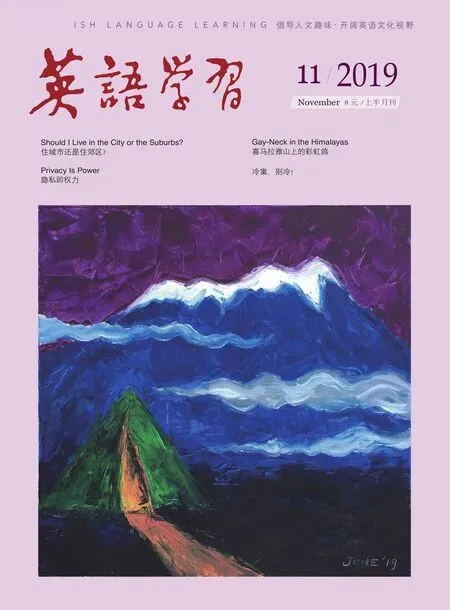《切尔诺贝利》
——从谎言到真相的代价
2019-11-15宋云峰编写
∷宋云峰 编写
切尔诺贝利核事故,或称“切尔诺贝利事件”,是一起发生在苏联时期乌克兰境内切尔诺贝利核电站的核子反应堆事故。该事故被认为是历史上最严重的核电事故,也是首例被国际核事故分级表评为第七级事故的特大事故(第二例是2011年3月11日发生在日本福岛县的福岛第一核电站事故)。核电站附近的普里皮亚季城因此被废弃。1986年4月26日凌晨1点23分,乌克兰普里皮亚季附近的切尔诺贝利核电厂第四号反应堆发生了爆炸。连续爆炸引起了大火并将大量高能辐射物质扩散到大气层中,辐射尘埃涵盖了东欧和北欧大面积区域。这次事故所释放出的辐射剂量是二战时期爆炸于广岛的原子弹的400倍以上。这场灾难总共造成大约两千亿美元的损失,是近代历史中代价最“昂贵”的灾难事件。2019年5月,美国HBO影视公司与英国天空电视台(Sky)合作拍摄的五集电视剧《切尔诺贝利》(Chernobyl)开播。在事故发生三十多年后重新审视事故的过程,仍令人心有余悸。《切尔诺贝利》试图以纪实电视剧(docudrama)的形式(剧中主要情节依据真人真事改编)还原事故的真相,然而,完全的真相也许永远不为人所知,核污染对人类和环境造成的长期损害也无可估量。巧妙的是,这部连续剧从第一集到最后一集,在故事结构上作了一个闭环处理,以负责处理核事故的科学顾问两年后自杀并留下录音遗言将观众带入两年前的那场核灾难。
第一集的标题《1: 23: 45》,是被苏联当局召来处理这起核事故的科学家莱加索夫教授(Valery Legasov)两年后(1988年)在家中自杀的时间,由此带入两年前(1986年)发生的那场核灾难。两年来,莱加索夫一直承受着政府的压力,不敢向公众和国际社会披露核事故的真相。他最终选择在录音机上录下六盘真相记录后自杀。他的证言充满了对谎言和官僚主义的谴责:真正的危险是如果我们听了太多的谎言,我们就再也认不清事实了。(The real danger is that if we hear enough lies,then we no longer recognize the truth at all.)核事故直接责任人迪亚特洛夫(Dyatlov,系核电厂副总工程师,当时负责对四号核反应堆进行汽轮机违规测试而引发核反应堆爆炸)死有余辜却仅被判了十年徒刑。正义何在?出现这种境况究竟该怪谁呢?(Who is to blame?)

影片中的科学家莱加索夫教授
What is the cost of lies? It's not that we'll mistake them for the truth.The real danger is that if we hear enough lies, then we no longer recognize the truth at all.What can we do then? What else is left to abandon even the hope of truth and content(使满足)ourselves instead with stories(传说,故事)? In these stories, it doesn't matter who the heroes are.All we want to know is: “Who is to blame?” In this story, it was Anatoly Dyatlov.He was the best choice.An arrogant, unpleasant man, he ran the room(核电站控制室)that night, he gave the orders...and no friends.Or at least, not important ones.And now Dyatlov will spend the next ten years in a prison labor camp(监狱劳改营).Of course, that sentence is doubly unfair.There were far greater criminals(指间接造成核事故瞒报和拖延处理核事故的核电厂厂长、总工程师以及政府各级官员们)than him at work.And as for what Dyatlov did do, the man doesn't deserve prison.He deserves death.
莱加索夫在谴责了造成核事故的直接责任人和政府的官僚作风之后,决定将真相录下来留给后人,尽管他的证言仍可能被一如既往地否认。(They'll deny it, of course.They always do.)
“But instead, ten years for ‘criminal mismanagement'(管理不当罪).What does that mean? No one knows.It doesn't matter.What does matter is that, to them, justice was done.Because, you see, to them, a just world is a sane(理智的,正常的)world.There was nothing sane about Chernobyl.What happened there, what happened after,even the good we did, all of it...all of it, madness.Well,I've given you everything I know.They'll deny(否认)it, of course.They always do.I know you'll try your best.”

《切尔诺贝利》海报
接下来,故事闪回到两年前的事故现场。四号核反应堆由于对汽轮机进行违规测试而发生了爆炸。收到手下紧急报告后,负责测试的控制室副总工程师迪亚特洛夫错误地判断是冷却水箱(water tank)破裂,因为他固执地认为,核反应堆固若金汤,是不可能发生爆炸的。
Aleksandr Akimov: Comrade Dyatlov? Comrade Dyatlov?!
Anatoly Dyatlov: What just happened?
Leonid Toptunov: I don't know.
Vyacheslav Brazhnik: There's a fire in the turbine hall(汽轮机室).
Dyatlov: The turbine hall...The control system tank(控制系统的冷却水箱).Hydrogen(氢气).[addressing Akimov] You and Toptunov, you morons(蠢货)blew the tank.
Toptunov: No, that's not—
Dyatlov: This is an emergency, everyone stays calm.Our first priority is to—
Valeriy Perevozchenko: It exploded!
Dyatlov: We know.Akimov, are we cooling the reactor core(给核反应堆内核降温)?
Akimov: We shut it down, but the control rods(控制棒)are still...They're not all the way in(控制棒没有全部插入内核), I disengaged the clutch(松开了离合器)—
Dyatlov: Alright, I'll disconnect the servos(伺服传动装置)from the standby console(备用控制台).[to two other engineers] You two, get the backup pumps(备用水泵)running, we need water moving through the core(需要用水浇内核来降温), that is all that matters!
Perevozchenko: There is no core! It exploded, the core exploded!
[Beat as all the engineers stare at Perevozchenko in disbelief and fear]
Dyatlov: He's in shock(被震糊涂了), get him out of here.
Perevozchenko: The lid is off.The stack(烟囱)is burning, I saw it.
Dyatlov: You're confused, RBMK(石墨核反应堆)reactor cores don't explode.Akimov!
Akimov: [to Toptunov] Don't worry, we did everything right.Something...something strange has happened.
Toptunov: Do you taste metal?(嘴里尝到金属味道没?)
Dyatlov: Akimov!
Akimov: [to Perevozchenko] Comrade Perevozchenko, what you're saying is physically impossible.The core can't explode.It has to be the tank.
[Perevozchenko wordlessly shakes his head]
Dyatlov: We're wasting time.Let's go.Get the hydrogen(氢气)out of the generators(发电机组)and pump water into the core.
Brazhnik: What about the fire?
Dyatlov: [annoyed; as if it were obvious] Call the fire brigade(消防队).[storms out]
与此同时,本地和临近地区的消防队被紧急调集到核电厂,集中力量来用水“灭火”,消防队成员包括当地的帅小伙瓦西里(Vasily)。他是从睡梦中被叫醒去救援的,而他的妻子柳德米拉听到惊动整个城市的爆炸声,看到火光冲天和浓烟滚滚,对丈夫的安危非常担忧。
在核电厂召开的紧急会议上,负责测量辐射量的工程师汇报了测到的极高(爆表)辐射量并说看到了只有核反应堆内部才可能有的石墨,断定核反应堆内核发生了爆炸。迪亚特洛夫仍固执否认四号核反应堆爆炸的可能性,因为核燃料只会融穿保护层。
[April 26, 1986: Meeting in the power plant office,engineer Anatoly Sitnikov reports high radiation in reactor 4]
Dyatlov: What's wrong with you? How'd you get that number from feedwater(冷却水)leaking from a blown tank?
Anatoly Sitnikov: You don't.
Dyatlov: Then what the fuck are you talking about?
Sitnikov: I...[clears throat] I walked around the exterior of building 4.I think there's graphite(石墨)on the ground in the rubble(碎片).
Dyatlov: You didn't see graphite.
Sitnikov: I did.
Dyatlov: You didn't.YOU DIDN'T! Because it's NOT THERE!
Nikolai Fomin(核电厂总工程师): What, are you suggesting the core...what? Exploded?
Sitnikov: [almost a whisper] Yes.
Fomin: Sitnikov, you're a nuclear engineer.So am I.So please tell me how an RBMK reactor core explodes.Not a meltdown(融化), an explosion.I'd love to know.
Sitnikov: I can't.
Fomin: Are you stupid?
Sitnikov: No.
Fomin: Then why can't you?
Sitnikov: I...[stammers] I don't see how it could explode.[Fomin looks satisfied] But it did.
Dyatlov: [pounds the table] Enough! I'll go up to the vent(废气出口)block roof.From there, you can look right down into reactor building 4.I'll see it with my own...with my own eyes.[vomits on the table] I apologize.[collapses]
接下来,核电厂管理层与当地政府执行委员会就事故举行了联合会议。会上有人对核事故潜在的危害提出质疑,建议撤离当地所有居民,但是执委会负责人则将处理好核反应堆事故上升到事关国家机密和苏联声誉的政治任务高度,建议封锁该地区,防止核事故消息外传,并向上级谎报军情,试图掩盖真相。
Zharkov: I wonder how many of you know the name of this place.We all call it “Chernobyl”, of course.What is its real name?
Viktor Bryukhanov: The Vladimir I.Lenin Nuclear Power Station(弗拉迪米尔·伊里奇·列宁核电站).
Zharkov: Exactly.Vladimir I.Lenin.[points to the image of Lenin on the nearby wall] And how proud he would be of you all tonight.Especially you, young man, the passion you have for the people.For is that not the sole purpose of the apparatus(机构)of the State?Sometimes we forget.Sometimes we fall prey to fear(成为恐惧的牺牲品).But our faith in Soviet socialism will always be rewarded.Now the State tells us the situation here is not dangerous.Have faith, comrades.The State tells us it wants to prevent a panic.Listen well! It's true,when the people see the police, they will be afraid.But it is my experience that when the people ask questions that are not in their own best interest, they should simply be told to keep their minds on their labor and leave matters of the State to the State.We seal off(封锁,隔离)the city.No one leaves.And cut the phone lines.Contain(控制,遏制)the spread of misinformation.That is how we keep the people from undermining(破坏)the fruits of their own labor.Yes, comrades...we will all be rewarded for what we do here tonight.This is our moment to shine.
可怜的当地居民对核辐射的危害一无所知,有些居民甚至靠近事故现场观看救火情形。
切尔诺贝利核事故发生后不久,欧洲国家(检测到飘散在大气中的放射性尘埃)和美国(卫星照相事故现场)都测试或观察到切尔诺贝利核电站的爆炸、大火和由此引起的浓烟粉尘,纷纷向苏联政府提出质询。由于接到的报告说这是个小事故,并且已得到控制,苏联政府对国际社会矢口否认核物质扩散的问题。核反应堆专家莱加洛夫就是在这一背景下被召到莫斯科,参加由苏共总书记戈尔巴乔夫召集的紧急高层应对会议。那么,他们是怎样应对事故的呢?
